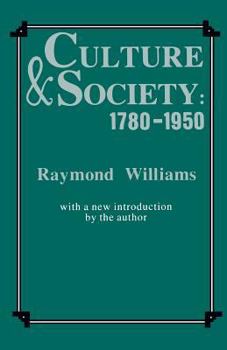Culture and Society, 1780-1950
Select Format
Select Condition 
Book Overview
Acknowledged as perhaps the masterpiece of materialist criticism in the English language, this omnibus ranges over British literary history from George Eliot to George Orwell to inquire about the complex ways economic reality shapes the imagination.
Format:Paperback
Language:English
ISBN:0231057016
ISBN13:9780231057011
Release Date:April 1983
Publisher:Columbia University Press
Length:363 Pages
Weight:0.97 lbs.
Dimensions:1.0" x 5.4" x 8.2"
Grade Range:Postsecondary and higher
Related Subjects
Civilization & Culture Criticism & Theory History History & Criticism Humanities Literary Criticism Literary Criticism & Collections Literature Modern (16th-21st Centuries) Movements & Periods Philosophy Political Science Politics & Social Sciences Social Science Social Sciences Sociology Textbooks WorldCustomer Reviews
2 ratings
A World in Transition
Published by Thriftbooks.com User , 20 years ago
Raymond Williams discusses how the idea of "culture" and "society" evolved in England when two forces (democracy, industrialism) were undermining traditional notions of both. Williams is a Marxist and it is clear that his analysis of Burke, Coleridge, Mill, Carlyle, Newman, Arnold etc... is directed by Marx's theory of class relationships. The book, therefore, is both an analysis and an argument. The analysis/argument is that democracy and industrialism broke down old relationships and initiated new ones. While this shift was occuring a new kind of writer was born: the cultural critic. The major theme of this book is the evolution of the word "culture" . Before the period in question (1780-1950) the word "culture" was used to describe art and literature but beginning with Burke and Coleridge the word begins to be used to refer to a "whole way of life". Coleridge makes the key distinction between "civilization" and "culture". Coleridge uses the word "civilization" to describe the "general progress of society" and he uses the word "culture" to express a standard of perfection independent of the progress of society that could be used "not merely to influence society but to judge it." Coleridge envisioned a class of men or "clerisy" whose sole task would be to tend to the cultivation of society. The great fear in the minds of nineteenth-century educated Englishman was that democracy would lead to a dumming down of public life and that what society really needed was some class of educated individuals(Coleridge) or some heroic individual (Carlyle) to insure the continued cultivation of society. Raymond Williams is writing from a working-class perspective but he is a working-class kid who also happened to attend Cambridge. Writing from this unique perspective allows him to identify with both the great cultural thinkers of the past and with the "masses" that they feared. Coleridge and Carlyle felt that the masses were incapable of governing themselves and contributing to the continued cultivation of society(a notion that continues to inform much of modern conservastism). Williams suggests that it is a mistake to think of men as "masses" and that for society to grow it must remain open, and that society must encourage individual effort from all segments of society while continuing to value and cultivate a collective way of life. Exactly how society is to do this is explained only in vague platitudes. The best and strongest part of the book is the early portion that examines the definition of "culture" as opposed to "society". The argument gets fuzzy around the time of Matthew Arnold who could not quite decide just what constitutes "culture". In the nineteenth-century "culture" is tied to religious tradition in the minds of Burke, Coleridge, Carlyle and Newman. Beginning with Arnold, however, cultural critics attempt to define "culture" without reference to religion. This proves to be difficult as "culture" describes no
Excellent
Published by Thriftbooks.com User , 24 years ago
Williams examines the development of the English novel (and the language itself) as a means to socio-political criticism. The section on the Romantic Period is excellent, as are the sections on Eliot and Orwell. This isn't your typical "critical theory" work: Williams doesn't use the ridiculous theoretical schemes often found in the field. Also, while his analysis is ultimately radical left, Williams remains undogmatic and clear-headed throughout (also a rarity), attributable in part I think to his working class background (this is really one of the themes of the work itself - upper middle-class liberalism and "radicalism" versus working-class radicalism). Don't be put off by the claim that this is a "materialist analysis." Yes, he describes the creation of the author as the result of an economic/social process, but this isn't the main thrust of the work. If nothing else, read this book for Williams's sensitivity to the origins and meanings of the "keywords" of the English language.





